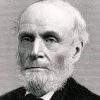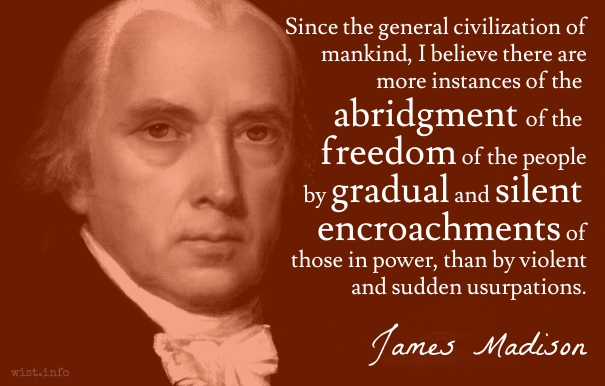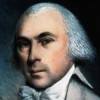France was long a “Despotism tempered by Epigrams.”
Thomas Carlyle (1795-1881) Scottish essayist and historian
The French Revolution: A History, Part 1, Book 2, ch. 4 (1.2.4) (1837)
(Source)
Though given in quotation marks, Carlyle is apparently "quoting" himself.
This quotation is commonly given on its own, though, since Carlyle's thesis at this point in his history is that the royal government had largely become irrelevant in the nation, he continues:
... and now, it would seem, the Epigrams have got the upper hand.
[Source]
Quotations about:
despotism
Note not all quotations have been tagged, so Search may find additional quotes on this topic.
If a law commands me to sin I will break it; if it calls me to suffer, I will let it take its course unresistingly. The doctrine of blind obedience and unqualified submission to any human power, whether civil or ecclesiastical, is the doctrine of despotism, and ought to have no place among Republicans and Christians.
Angelina Grimké Weld (1805-1879) American abolitionist, women's rights activist
“Appeal to the Christian Women of the South,” Anti-Slavery Examiner (Sep 1836)
(Source)
When Christianity asks the aid of government beyond mere impartial protection, it denies itself. Its laws are divine, and not human. Its essential interests lie beyond the reach and range of human governments. United with government, religion never rises above the merest superstition; united with religion, government never rises above the merest despotism; and all history shows us that the more widely and completely they are separated, the better it is for both.
John Welch (1805-1891) American politician, jurist
Board of Education of Cincinnati v. Minor, Ohio Supreme Court (1872)
(Source)
Since the general civilization of mankind, I believe there are more instances of the abridgment of the freedom of the people by gradual and silent encroachments of those in power, than by violent and sudden usurpations.
Prudence, indeed, will dictate that Governments long established should not be changed for light and transient causes; and accordingly all experience hath shewn, that mankind are more disposed to suffer, while evils are sufferable, than to right themselves by abolishing the forms to which they are accustomed. But when a long train of abuses and usurpations, pursuing invariably the same Object evinces a design to reduce them under absolute Despotism, it is their right, it is their duty, to throw off such Government, and to provide new Guards for their future security.
Thomas Jefferson (1743-1826) American political philosopher, polymath, statesman, US President (1801-09)
“Declaration of Independence” (1776-07-04)
(Source)
As modified and approved by the Continental Congress. Jefferson's "original rough draft" is very similar:
Prudence indeed will dictate that governments long established should not be changed for light & transient causes: and accordingly all experience hath shewn that mankind are more disposed to suffer while evils are sufferable, than to right themselves by abolishing the forms to which they are accustomed. but when a long train of abuses & usurpations, begun at a distinguished period, & pursuing invariably the same object, evinces a design to subject them to arbitrary power, it is their right, it is their duty, to throw off such government & to provide new guards for their future security.
Is man ever a creature to be trusted with wholly irresponsible power? And does not the slave system, by denying the slave all legal right of testimony, make every individual owner an irresponsible despot? Can anybody fall to make the inference what the practical result will be? If there is, as we admit, a public sentiment among you, men of honor, justice and humanity, is there not also another kind of public sentiment among the ruffian, the brutal and debased? And cannot the ruffian, the brutal, the debased, by slave law, own just as many slaves as the best and purest? Are the honorable, the just, the high-minded and compassionate, the majority anywhere in this world?
The Revolution is like Saturn — it eats its own children.
Karl Georg Büchner (1813-1837) German dramatist
Danton’s Death, Act I (1835)
Also attributed to Pierre Vergniaud, Girondin politician, speaking at the French National Assembly (16 Mar 1793): "Citizens, we now have cause to fear that the Revolution, like Saturn successively devouring his children, has finally given way to despotism and all the calamities that despotism implies."
Our progress in degeneracy appears to me to be pretty rapid. As a nation we began by declaring that “all men are created equal.” We now practically read it “all men are created equal, except Negroes.” When the Know-Nothings get control, it will read “all men are created equal, except Negroes and foreigners and Catholics.” When it comes to this, I shall prefer emigrating to some country where they make no pretence of loving liberty — to Russia, for instance, where despotism can be taken pure, and without the base alloy of hypocrisy.
Abraham Lincoln (1809-1865) American lawyer, politician, US President (1861-65)
Letter to Joshua Speed (1855-08-24)
(Source)
And I will war, at least in words (and — should
My chance so happen — deeds), with all who war
With Thought; — and of Thought’s foes by far most rude,
Tyrants and sycophants have been and are.
I know not who may conquer: if I could
Have such a prescience, it should be no bar
To this my plain, sworn, downright detestation
Of every despotism in every nation.









